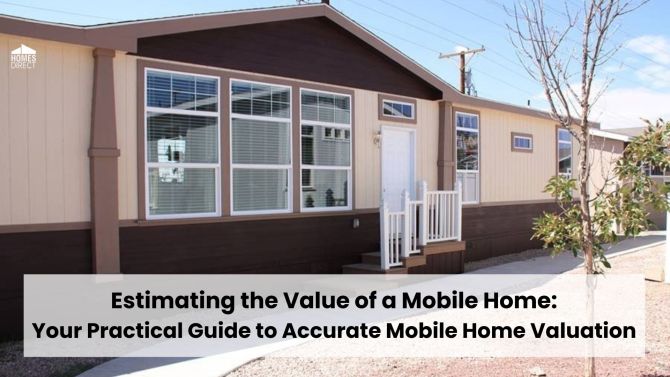Mobile homes have become a popular housing choice thanks to their affordability and flexibility. But when it comes time to buy, sell, or refinance, many owners find themselves asking the same question: what is my mobile home worth?
Understanding mobile home value is important for making smart financial decisions. Unlike traditional houses, mobile homes follow their own set of rules when it comes to pricing, which can make estimating value a little more complex.
In this article, we’ll look at what affects the value of a mobile home, how you can estimate it, whether through a mobile home value calculator or professional appraisal, and what steps you can take to increase it over time.

Why Mobile Home Valuation is Different?
When it comes to figuring out mobile home value, the process isn’t quite the same as valuing a traditional house. A stick-built home usually gains value over time because the land it sits on often appreciates. Mobile homes, on the other hand, can behave more like vehicles; they may lose value as they age, especially if the land underneath isn’t included in the sale.
Another key difference is classification. Depending on whether your mobile home is attached to land, it may be considered personal property rather than real estate. This affects both how it’s financed and how it’s appraised.
Finally, local markets play a big role. In some areas, mobile homes are in high demand and hold value better. In others, where manufactured housing is less common, resale prices may be lower.
Because of these differences, owners often turn to a mobile home value estimator or professional appraisal to get an accurate picture of what their home is worth.
Key Factors That Determine Mobile Home Value
Several factors come into play when determining what a mobile home is worth. While the purchase price sets the starting point, long-term value depends on age, condition, land, and design. Here are the main elements buyers and appraisers consider:
Age and Condition
The age of the home is one of the biggest drivers of value. Homes built after June 15, 1976, must comply with federal HUD safety and construction standards, which makes them more desirable and often easier to finance. These homes generally retain value better than older models.
Condition is equally important. A 10-year-old mobile home that has been well cared for, regular roof sealing, updated plumbing, and modern appliances, may sell for much more than a newer home that’s been neglected. Signs of water damage, outdated wiring, or sagging floors can quickly lower the asking price.
In short: maintenance directly impacts resale. Keeping up with small repairs over time can add thousands of dollars to eventual resale value.
Learn more: Unlocking the Secret: How Long Do Mobile Homes Last?
Location and Land Ownership
Where the mobile home is placed has a huge effect on its value. A home located on land that you own outright usually commands a higher price than one in a rental community. That’s because buyers not only get the home but also the long-term security of owning the land beneath it.
By contrast, homes in mobile home parks or communities can have lower resale value, even if the home itself is in great shape. Lot rent adds an ongoing cost for the buyer, which reduces how much they’re willing to pay upfront.
Location at the regional level also matters. Homes in growing cities, near good schools, or in high-demand states tend to sell faster and at higher prices. In rural areas with lower demand, the same home might be valued much less.
Size and Layout
Size is another key factor. Single-wide homes, which are narrower and easier to transport, are the most affordable and therefore often sell for less. Double-wides and triple-wides, with more living space and flexibility in design, can command much higher resale prices.
The layout itself also influences value. Open floor plans, spacious kitchens, multiple bathrooms, and features like walk-in closets or energy-efficient windows make a mobile home more appealing to today’s buyers. These details may not change the square footage, but they can raise overall value by improving livability.
Types of Appraisals for Mobile Homes
If you want an accurate estimate of mobile home value, there are several approaches you can take. Each has its strengths and works best in different situations, so many owners use more than one method to get a realistic picture.
Comparing Types of Mobile Home Appraisals
|
Method |
Cost |
Accuracy |
Best For |
Limitations |
|
Professional Appraisal |
$300–$600 |
★★★★★ |
Refinancing, loans, or getting the most precise value |
Takes time, requires scheduling |
|
NADA Value Guide |
$30–$50 (per report) |
★★★★☆ |
Quick starting point, lender reference in some cases |
Doesn’t account for local markets or upgrades |
|
Comparative Market Analysis (CMA) |
Usually free (via agent) |
★★★★☆ |
Setting an asking price when selling |
Not lender-approved, depends on agent’s expertise |
|
Online Value Estimator / Calculator |
Free or low-cost |
★★★☆☆ |
Instant ballpark estimate |
Broad averages, may miss land value or renovations |
Professional Appraisal
Hiring a licensed appraiser is the most reliable way to determine value. The appraiser will:
-
Inspect the home’s age, size, and condition
-
Note upgrades or damage (new flooring vs. roof leaks, for example)
-
Factor in whether the home is on owned land or in a community
-
Compare it to recent sales of similar homes nearby
This method is considered the gold standard for lenders and is often required for refinancing or loans.
Pros: Accurate, lender-approved, tailored to your home.
Cons: Costs $300–$600, takes time to arrange.
NADA Manufactured Home Value Guide
The NADA guide is like the Kelley Blue Book for manufactured housing. By entering the year, make, model, size, and features, you’ll get a value range based on national data. For example, a 2012 double-wide in good condition might be valued at $55,000–$65,000.
It’s a useful starting point but doesn’t account for local real estate markets or land ownership.
Pros: Quick, industry-recognized, easy to use.
Cons: Doesn’t reflect local demand or recent renovations.
Comparative Market Analysis (CMA)
A CMA is typically prepared by a real estate agent who specializes in manufactured homes. It looks at recent sales of similar properties in your area and adjusts for differences in size, features, and condition.
For instance, if similar double-wides in your community sold between $80,000 and $90,000, the CMA would suggest a similar listing range.
Pros: Reflects real-time local demand, usually free if you’re selling through an agent.
Cons: Not accepted by lenders for refinancing, less formal than a professional appraisal.
Online Mobile Home Value Estimator
Online tools, sometimes called a mobile home value calculator, allow you to enter details like year, size, condition, and zip code. They generate instant estimates based on databases of sales and industry averages.
For example, a 1998 single-wide in Ohio might show an estimated resale value of $18,000–$25,000.
Pros: Fast, convenient, often free.
Cons: Broad estimates, may overlook upgrades, unique features, or land value.
Using a Mobile Home Value Calculator
If you’re not ready to hire an appraiser, a mobile home value calculator is one of the quickest ways to get a ballpark estimate. These online tools ask for key details about your home and then use databases of past sales and industry averages to generate a suggested price range.
What You’ll Need to Enter
Most calculators will ask for:
-
Year and manufacturer – newer models built to HUD standards often carry more value.
-
Size and dimensions – whether your home is a single-, double-, or triple-wide.
-
Location – zip code or region, which affects demand and land values.
-
Condition – well-kept vs. needing repairs.
-
Features and upgrades – energy-efficient windows, decks, or remodeled kitchens can raise the value.
Let’s say you own a 2008 double-wide in good condition in Texas. After entering the year, size, and zip code, the calculator might estimate a resale value of $60,000–$75,000. If you had recently added a new HVAC system and updated flooring, the number might climb higher.
How to Sell a Mobile Home for Maximum Value
Once you know your mobile home value, the next step is making sure you sell it for the best possible price. Success comes down to preparation, pricing, and the strategies you use to reach buyers.
Setting the Right Asking Price
Pricing too high can scare off buyers, while pricing too low leaves money on the table. Use a mix of tools; a mobile home value calculator, a CMA from an agent, and, if needed, a professional appraisal; to set a competitive but realistic price. Always check what similar homes in your area are selling for.
Tip: If your home is in a park, ask management what other units recently sold for; they often know the local market better than anyone.
Best Selling Strategies
-
List on the right platforms: Sites like MHVillage and local real estate listings are tailored to manufactured homes.
-
Highlight upgrades: Emphasize energy-efficient windows, new appliances, or recent repairs. These details can justify a higher asking price.
-
Stage the home: Clean, declutter, and use neutral décor. Curb appeal also matters; fresh paint, tidy landscaping, and updated skirting make a strong first impression.
-
Be flexible with buyers: Offering assistance with financing information or covering small repairs before closing can make your home more appealing.
Selling a mobile home takes planning, but with the right pricing and marketing, you can maximize your return and attract serious buyers faster.
Conclusion
Determining mobile home value isn’t always straightforward, but it’s an important step whether you’re planning to sell, refinance, or simply keep track of your investment. Unlike traditional real estate, mobile homes are influenced heavily by age, condition, size, and location, but with the right tools, you can get a reliable estimate.
From professional appraisals to a quick mobile home value calculator, each method has its place. Once you understand your home’s worth, you can take steps to protect or even increase it, through upgrades, regular maintenance, and smart staging. And when the time comes to sell, setting the right price and using the best strategies will help you get maximum return.
In short, knowing how to value a mobile home gives you confidence and control. With the right information, you’ll be prepared to make the most of your home; both now and in the future.


